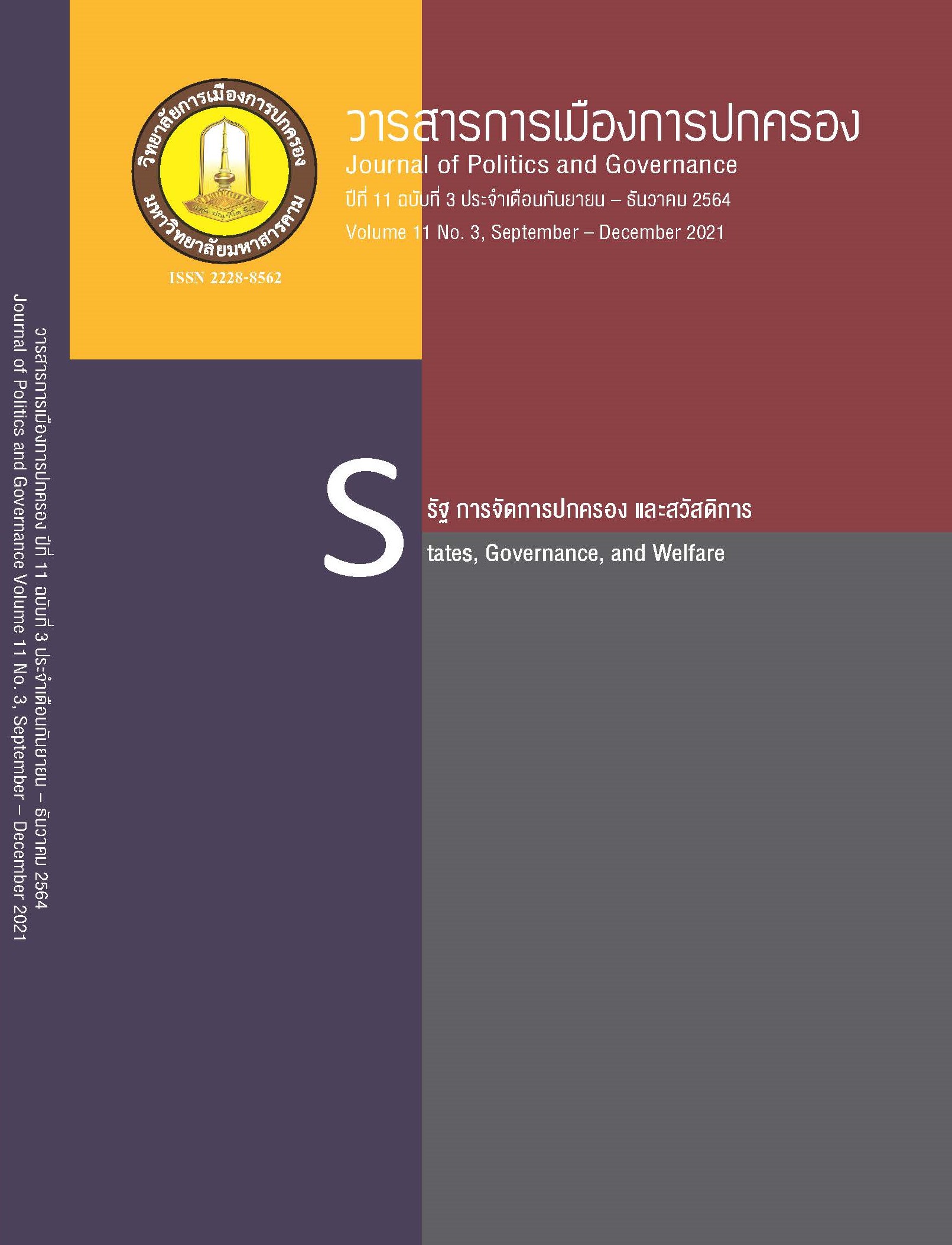ขบวนการเคลื่อนไหวทางสังคมของกลุ่มครูในด้านการศึกษา กรณีศึกษากลุ่มครูในภาคตะวันออกเฉียงเหนือ
Main Article Content
บทคัดย่อ
การวิจัยนี้มีวัตถุประสงค์ 1)เพื่อศึกษากระบวนการรวมกลุ่มสร้างพื้นที่และเครือข่ายทางสังคมด้านการศึกษาของกลุ่มครู 2)เพื่อศึกษาวิเคราะห์ขบวนการเคลื่อนไหวของกลุ่มครูด้านโครงสร้างรูปแบบวิธีดำเนินการยุทธวิธีของขบวนการเคลื่อนไหวในด้านการศึกษา 3) เพื่อศึกษาผลกระทบ จากขบวนการเคลื่อนไหวทางสังคมของกลุ่มครูในด้านการศึกษา เป็นการวิจัยเชิงคุณภาพ กลุ่มเป้าหมายที่ใช้สำหรับการวิจัยคือผู้นำกลุ่มครูในเขตภาคตะวันออกเฉียงเหนือจำนวน 45 คน โดยการสัมภาษณ์แบบเจาะลึก ผลการศึกษาพบว่า 1) ขบวนการเคลื่อนไหวของกลุ่มครู ในกระบวนการรวมกลุ่มสร้างพื้นที่และเครือข่ายทางสังคมด้านการศึกษา กลุ่มครูรวมกลุ่มสร้างพื้นที่และเครือข่ายทางสังคมในรูปแบบที่เป็นองค์กรครูที่มีกฎหมายรัฐธรรมนูญรองรับ มีพลวัตการเคลื่อนไหวอย่างต่อเนื่องหลายทศวรรษ 2)โครงสร้างรูปแบบ วิธีดำเนินการ ยุทธวิธีของขบวนการเคลื่อนไหว ในด้านการศึกษา โครงสร้างรูปแบบของกลุ่มครูดำเนินงานในรูปขององค์กรใช้ชื่อเรียกเป็น สมาคมครู ชมรมครู สมาพันธ์ครู เป็นต้น มีคณะกรรมการบริหารดำเนินการ วิธีดำเนินการยุทธวิธี ของขบวนการเคลื่อนไหวในรูปแบบองค์กรในระดับระดับอำเภอ ระดับเขตพื้นที่การศึกษา ระดับจังหวัด ระดับภาค และระดับประเทศ โดยการดำเนินการเป็นขั้นตอน ดังนี้ การประชุมหามติข้อสรุป ตั้งคณะทำงานและประสานกับผู้มีอำนาจในรัฐบาล รณรงค์ให้ครูและบุคลากรทางการศึกษาร่วมลงลายมือชื่อเสนอแก้ไขกฎหมายพร้อมทั้งร่วมลงลายมือชื่อเพื่อถวายฎีกา รณรงค์ให้ครูและบุคลากรทางการศึกษาแสดงออกในเชิงสัญลักษณ์ และการชุมนุมประท้วง 3) ผลกระทบจากขบวนการเคลื่อนไหวทางสังคมของกลุ่มครูในด้านการศึกษา กลุ่มครูสามารถต่อรองกับผู้มีอำนาจรัฐในการเปลี่ยนแปลงนโยบาย กฎหมาย กฎกระทรวง ระเบียบข้อบังคับที่มีผลต่อความมั่นคงในวิชาชีพครูและด้านปฏิรูปการศึกษา และพบว่าในการเคลื่อนไหวทางสังคมของกลุ่มครูนั้น ครูมีทุนทางสังคม มีความชอบธรรมทางสังคม และยังพบระบบอุปถัมภ์ในระบบราชการ
Article Details
เอกสารอ้างอิง
คำสั่งหัวหน้าคณะรักษาความสงบแห่งชาติ ที่ 19/2560 เรื่อง การปฏิรูปการศึกษาในภูมิภาคของกระทรวงศึกษาธิการ. (2560, 3 เมษายน). ราชกิจจานุเบกษา. เล่ม 134 ตอนพิเศษ 69 ง. 1-9.
เจมส์ ซี, สกอตต์. (2539). การเมืองในระบบผู้อุปถัมภ์กับผู้รับอุปถัมภ์ และการเปลี่ยนแปลงทางการเมืองในเอเชียตะวันออกเฉียงใต้. ระบบอุปถัมภ์. (ปรีชา คุวินทร์พันธุ์, ผู้แปล). กรุงเทพฯ: สำนักพิมพ์แห่งจุฬาลงกรณ์มหาวิทยาลัย.
ฉวีวรรณ สายบัว. (2546, 25 สิงหาคม). คอลัมน์ เศรษฐกิจระบบสารสนเทศ. ประชาชาติธุรกิจ, น. 6
ประภาส ปิ่นตบแต่ง. (2552). กรอบการวิเคราะห์การเมืองแบบทฤษฎีขบวนการทางสังคม. เชียงใหม่: มีดีไซน์เชียงใหม่.
ยอดพล เทพสิทธา. (2557, 15 สิงหาคม). ผลกระทบต่อระบบการเมือง การปกครองท้องถิ่น และมุมมองต่ออนาคตของการมีส่วนร่วมของประชาชน และประชาธิปไตยของส่วนท้องถิ่นหลังมีประกาศ คสช.ทั้งสองฉบับ. คณะนิติศาสตร์ มหาวิทยาลัยนเรศวร. [บทสัมภาษณ์พิเศษ]. สืบค้นจาก https://www.tcijthai.com/news/2014/08/channel/4748
สถาบันวิจัยเพื่อการพัฒนาประเทศไทย. (2562, 15 กุมภาพันธ์). การปฏิรูปการศึกษารอบใหม่: สู่การศึกษาที่มีคุณภาพอย่างทั่วถึง. สืบค้นจาก https://tdri.or.th/
สถาบันส่งเสริมการสอนวิทยาศาสตร์และเทคโนโลยี. (2562, 3 ธันวาคม). ผลการประเมิน PISA 2518. กระทรวงศึกษาธิการ. สืบค้นจาก http://www.ipst.ac.th/index.php
สรพล สุริยาสาคร.(2545). แนวความคิดเรื่องความชอบธรรมในรัฐธรรมนูญแห่งราชอาณาจักรไทยพุทธศักราช 2540. (วิทยานิพนธ์ศิลปศาสตรมหาบัณฑิต ไม่ได้ตีพิมพ์). บัณฑิตวิทยาลัย มหาวิทยาลัยเชียงใหม่, เชียงใหม่.
Kurian, George Thomas. (2011). The encyclopedia of political science. Washington: CQ Press.
Mckinsey & Company. (2010). How the World’s Most Improved Systems Keep Getting Better. Retrieved from http://mckinseyonsociety.com/how-the-worlds-most-improvedschool-systems-keep-getting-better/


